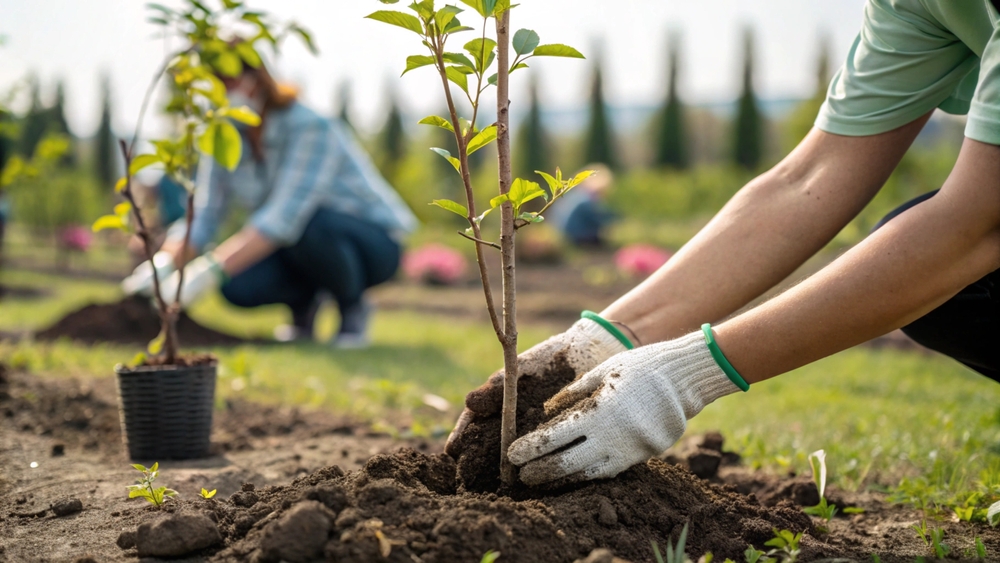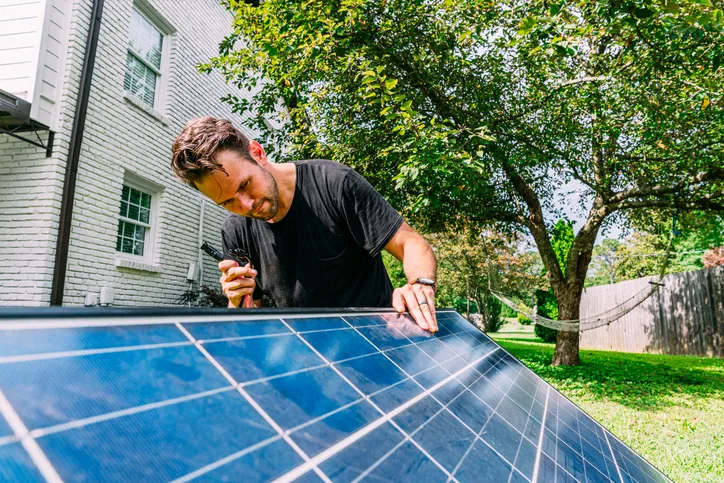Climate change can feel like an insurmountable challenge, but even small actions can have a significant impact. While individual efforts may seem like drops in the ocean, collectively they can foster substantial positive change. To help you contribute to this global effort, here are 14 actionable climate wins that, although small in execution, can collectively make a massive difference.
1. Switch to a Reusable Water Bottle

Swapping a single-use plastic bottle for a reusable one is a simple yet impactful choice. Not only does this reduce the demand for plastic production, but it also decreases the energy and resources needed for recycling and disposal. According to the Earth Day Network, a million plastic bottles are purchased every minute worldwide, and many end up in landfills or the ocean. By choosing a reusable option, you contribute to lowering this staggering figure.
Moreover, this switch saves you money in the long run. Imagine the cumulative cost of buying bottled water daily versus investing once in a reusable bottle. Plus, it’s an easy way to start conversations about sustainability. Before you know it, you could inspire others to ditch disposable plastics too.
2. Embrace Meatless Mondays

Cutting out meat just one day a week can significantly reduce your carbon footprint. Livestock farming is a major contributor to greenhouse gas emissions, and by reducing demand, you help decrease these emissions. The Meatless Monday campaign points out that even a small reduction in meat consumption can lead to savings in water usage and a reduction in deforestation. Plus, integrating more plant-based meals into your diet can be a creative and enjoyable culinary adventure.
Experimenting with new recipes can lead to healthier eating habits. Many plant-based meals are rich in nutrients that sometimes go overlooked in meat-heavy diets. Also, it’s a chance to explore global cuisines that traditionally focus on plant-based dishes. Your taste buds and the planet will thank you.
3. Opt for Energy-Efficient Appliances

When it’s time to replace household appliances, choosing energy-efficient models can make a big difference. These appliances use less electricity, which means fewer fossil fuels burned and lower greenhouse gas emissions. The U.S. Department of Energy highlights that Energy Star-rated products can save you up to 30% on your energy bill. It’s a win-win for your wallet and the environment.
The upfront cost might be higher, but the savings over the appliance’s lifetime offset this. It’s also a chance to modernize your home with the latest technology. As a bonus, many energy-efficient appliances come with rebates or tax incentives. In the long run, you’re reducing your carbon footprint without compromising on convenience.
4. Support Local Producers

Buying local produce reduces the carbon emissions associated with transporting food long distances. Supporting farmers’ markets and local producers not only cuts down on travel emissions but also strengthens your local economy. It’s an opportunity to enjoy fresher, seasonal produce that hasn’t been sitting in a truck or on a shelf for days. Plus, you create a direct connection with those who grow your food.
This practice encourages sustainable farming practices, as many local producers use environmentally friendly methods. You’re also reducing packaging waste, as local produce often comes with minimal to no packaging. It’s a tangible way to reduce your carbon footprint while enjoying delicious, healthy food. This habit fosters a greater sense of community and connection to what you eat.
5. Plant Trees and Native Plants

Tree planting is a powerful tool in combating climate change. Trees act as carbon sinks, absorbing CO2 from the atmosphere and providing oxygen in return. The Arbor Day Foundation notes that planting trees can also help regulate temperatures, conserve energy, and improve air quality. It’s a long-term investment in the health of our planet.
Planting native species in your garden supports local biodiversity. Native plants are adapted to your region’s soil and climate, requiring less water and maintenance. This choice boosts local wildlife, providing food and habitat for bees, butterflies, and birds. Your garden becomes a vital part of your local ecosystem.
6. Ditch Fast Fashion

Fast fashion’s environmental impact is massive, with the industry responsible for significant carbon emissions and water pollution. By choosing quality over quantity, you’re encouraging more sustainable practices. Investing in timeless, durable pieces reduces waste and supports ethical production methods. Plus, it shifts your mindset to valuing what you own.
Thrift shopping and clothing swaps are excellent alternatives to buying new. They extend the life of garments and reduce demand for new production. It’s also a chance to develop a unique personal style. Your wardrobe becomes a reflection of your values and creativity.
7. Utilize Public Transportation

Opting for public transportation over driving can substantially reduce your carbon footprint. Buses, trains, and subways emit less CO2 per passenger than individual cars. A study by the American Public Transportation Association found that public transit saves the U.S. 37 million metric tons of carbon emissions annually. Choosing public transport is a simple yet effective action for the climate.
It’s also a stress-free alternative to driving, allowing you to read, relax, or catch up on work. Many cities are investing in greener public transport options, such as electric buses, making it an increasingly climate-friendly choice. It can also save you money on gas, parking, and car maintenance. Plus, using public transportation often connects you more closely with your community.
8. Reduce, Reuse, Recycle

The classic three Rs remain a cornerstone of sustainable living. Reducing consumption minimizes waste, reusing keeps items out of landfills, and recycling ensures materials are processed responsibly. It’s about making conscious choices and seeing waste as a resource. You’re part of building a circular economy that values resources.
Start with small changes at home, like using reusable bags and containers. Set up a recycling system that’s easy to follow, encouraging everyone in your household to participate. It’s also about being mindful when shopping, choosing products with minimal packaging. Every effort counts and contributes to reducing your overall environmental impact.
9. Advocate for Renewable Energy

Pushing for renewable energy sources like wind and solar can drive significant change. Supporting policies and companies that prioritize renewables helps shift our energy systems away from fossil fuels. Being informed and vocal about the benefits of renewable energy can influence both local and national policy. It’s about being part of a collective push towards a sustainable future.
Consider installing solar panels if feasible, or switching to a green energy provider. These choices directly support the transition to cleaner energy. Encouraging your workplace or community to explore renewable options amplifies your influence. Every voice and action moves us closer to a sustainable energy future.
10. Educate Yourself and Others

Understanding climate science and its implications empowers you to make informed decisions. Knowledge allows you to engage in meaningful conversations and inspire others. By staying informed through reputable sources, you become a more effective advocate for change. Education is the foundation of collective action.
Share what you learn with friends, family, and your community. Social media platforms can be a powerful tool for spreading awareness. Hosting discussions or book clubs focused on environmental topics can spark collective action. Remember, informed people are the catalysts for meaningful change.
11. Reduce Water Waste

Conserving water is crucial, as it’s a finite resource essential to life. Small actions, like fixing leaks or taking shorter showers, can significantly reduce your water usage. The Water Footprint Network highlights that reducing water waste also decreases energy consumption, as water treatment and heating are energy-intensive processes. It’s about using what you need, not what you want.
Installing water-saving devices like low-flow showerheads and dual-flush toilets is a smart move. These can drastically cut your water consumption without sacrificing comfort. It’s also about being mindful, such as turning off the tap while brushing your teeth. These simple habits contribute to a more sustainable lifestyle.
12. Participate in Community Clean-Ups

Joining local clean-up events is a direct way to improve your environment. Removing trash from public spaces prevents pollution and protects wildlife. It’s a physical reminder of the impact of waste and the importance of responsible disposal. Plus, it connects you with like-minded people in your community.
Organizing your own clean-up event can maximize your impact. It’s a great way to involve friends, family, and neighbors in environmental action. These events often educate participants about waste management and environmental issues. They foster a sense of community pride and stewardship.
13. Monitor Your Carbon Footprint

Tracking your carbon footprint helps you understand the impact of your daily actions. Online calculators make it easy to identify areas where you can improve. Knowing your footprint empowers you to set realistic goals for reducing emissions. It’s about taking responsibility for your environmental impact.
Adjusting your habits based on this data can lead to significant changes. Whether it’s reducing energy use at home or choosing more sustainable travel options, every bit helps. It’s also a conversation starter, encouraging others to assess their impact. Together, these efforts lead to a collective reduction in emissions.
14. Support Environmental Organizations

Contributing to organizations dedicated to environmental protection amplifies your impact. These groups work on the front lines of climate action, conducting research, influencing policy, and implementing projects. Donations, volunteering, or simply spreading the word can significantly boost their efforts. It’s about leveraging collective resources for maximum effect.
Following their work keeps you informed about new developments and opportunities to get involved. Many organizations offer memberships, providing exclusive content and action plans. Supporting them aligns you with a network of passionate, committed people. Together, you’re part of a global movement striving for a healthier planet.
